Belgium’s prevention-driven health agenda has won international recognition, with Hans Kluge, WHO Regional Director for Europe, describing Health Minister Frank Vandenbroucke as “a champion in the European Union” for his efforts to curb tobacco and alcohol harm.
Prevention has become the backbone of Belgium’s 2025 health policy agenda, with Deputy Prime Minister and Minister for Social Affairs and Public Health Frank Vandenbroucke stressing that only early detection, healthier lifestyles and tougher regulation can reduce the burden of chronic disease.
In his policy note, he argued that prevention is essential not only to improve health outcomes but also to avoid unnecessary spending in an overstretched healthcare system.
The plan foresees stronger efforts on early detection and targeted vaccination to fight conditions such as cardiovascular disease and cancer, while ensuring citizens are informed of both the benefits and risks of screening.
Renewed Cancer Plan
Cancer remains a central concern, with the government preparing a renewed Cancer Plan to be launched by the end of the year, combining prevention, early detection, treatment and follow-up. Work is also underway on a new oncology care pathway designed together with providers and patients to ensure financing and organisation match today’s needs.
Broader prevention also extends to diabetes, women’s health issues such as menopause and endometriosis, and rare conditions, reflecting a cross-cutting vision that goes beyond single diseases.
Tobacco and alcohol as core priorities
Tobacco and alcohol are treated as core priorities.
Belgium is moving ahead with its ambition of a smoke-free generation by 2040, with measures this year to ban smoking rooms in public institutions, extend smoke-free zones to terraces, restrict flavoured e-cigarettes and reinforce bans on youth sales.
Enforcement is being tightened through new inspection powers and the deployment of underage mystery shoppers, who will test compliance with age limits throughout the year.
On alcohol, the government is rolling out actions under the Interfederal Alcohol Strategy. These include new restrictions on advertising aimed at minors, a shift in the standard health warning from “alcohol abuse is harmful” to the stronger “alcohol harms health”, and the creation of a legal framework for enforcement.
The dispute over ‘low-alcohol’ wine
It is against this backdrop that Belgium has clashed with its EU partners over wine labelling. As part of the ongoing revision of European wine regulations, member states, except Belgium, endorsed a proposal to authorise the term “low-alcohol” for wines with reduced alcohol content.
“This creates a total confusion about the meaning of the alcohol percentage in drinks,” Vandenbroucke told Euractiv. “Alcohol is harmful. Period. In Belgium, we consider a drink that does not harm itself as one with a very small percentage, let’s say 0.5%. But 6% is not a small percentage. If you drink a lot with 6% alcohol, you have a lot of alcohol in you.”
Vandenbroucke added, “The whole debate is about telling people that alcohol is harmful. We are not saying that you should never drink a glass of wine or a pint of beer. What we are saying is that it is harmful from the first dose. So, the idea that 6% alcohol means that a product is not harmful is wrong.”
Belgium’s Federal Public Health Service has also warned that “low-alcohol is a deception at the expense of our health. Authorising the term for wines with up to 6% alcohol sets a dangerous precedent in EU food legislation.”
Officials argue that the neutral term “reduced alcohol”, already established in EU food law, better describes a decrease in content without implying safety.
“It is very unfortunate that we, as a member state, are standing alone in this debate,” Vandenbroucke said. “First of all, because we cannot oppose this decision. But I think it is very unfortunate that this debate still has to be conducted. I plan to keep this debate on the public agenda in our own country, Belgium.”
Agriculture versus health competences
For Belgium, the debate also highlights an institutional gap. “During the negotiations at Council level, Belgium pleaded for the exclusion of the term ‘low-alcohol’. Unfortunately, the European wine legislation was dealt with within the agriculture department (CSA – Special Committee on Agriculture), where public health issues are not the primary focus,” a spokesperson from the Federal Public Health Service told Euractiv.
They added that strong cooperation between Belgian regions and the federal health service had enabled the country to oppose the measure, but such collaboration may not exist in other member states.
European Parliament holds the key
With the Council’s negotiating mandate now adopted, the European Parliament will have the decisive say. Belgium hopes MEPs will reject the “low-alcohol” label and instead back the use of “reduced alcohol”.
“The ball is now in the European Parliament’s court. Belgium hopes that it will also stand in favour of public health and use the negotiations with the Council to convince the other Member States and the European Commission that the only fair and acceptable alternative is ‘reduced alcohol’,” the Federal Public Health Service said.
Vandenbroucke confirmed that the debate will remain high on his agenda: “It is not about saying that you should never drink a glass of wine. But the point is that you have to tell people that the alcohol in it is actually harmful, even if it is a limited percentage.”
Looking ahead to next week’s EPSCO Council of health ministers, Vandenbroucke said: “We have a discussion about AMR. We also need to talk about the Critical Medicines Act. I hope that we can also talk about vaping. That would be great.”
(VA, BM)




